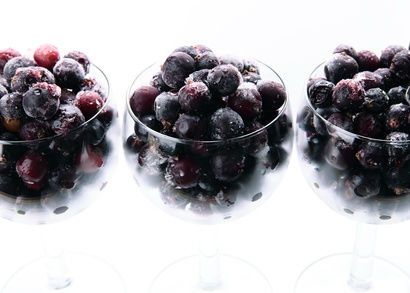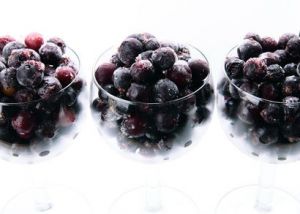
Do you pass by the frozen fruit section because you think that frozen is not up to par? Have you been told that frozen is a waste of money and that you should never buy it, or that it is the ultimate compromise during the dead of winter?
Obviously, fresh is great, and fresh and organic is even better. This has long been the mantra for healthy eaters everywhere. However, old school ideas about frozen fruit are being challenged by what some are calling a “new frozen,” aided by advanced quick freezing technology. Consumers who are interested in the best quality and competitive prices are now starting to realize that frozen is really quite cool, indeed.
We all know that eating plenty of fruits and veggies is an integral part of overall health and disease prevention. Whole foods such as fruits and vegetables are the best way to maintain and improve health while building a strong immune system.
There is a growing body of research supporting the consumption of berry fruits on longevity and health. Well known for their powerful antioxidant capabilities, berries have been found to have direct impacts on the brain.
Eating berries may help to prevent age-related neurodegeneration and motor function decline, according to a 2012 study published in the Journal of Agricultural and Food Chemistry. Both animal studies and human trials demonstrate a strong link between berry consumption, reduced inflammation and improved cognitive function.
Here are seven truths about frozen berries that will help you see frozen in a whole new light, and allow you to enjoy all of their amazing health benefits no matter the season!
Truth #1 Frozen berries are just as nutritious as fresh
As long ago as 1998, the FDA told us that frozen fruits and vegetables provide the same essential nutrients as fresh. This is good news when garden season ends in your region. You can either freeze your own or purchase frozen organic from your local grocer without being worried about nutrient quality. An example is wild blueberries. They top the ORAC (Oxygen Radical Absorbance Capacity; developed by the National Institutes of Health in Baltimore) chart of 40 tested foods.
Fresh or frozen, wild blueberries are the #1 antioxidant fruit. Studies done on strawberries and raspberries found that there was no difference statistically in the antioxidant levels of fresh and frozen. The conclusion for the raspberry study was, “that freshly picked, fresh commercial, and frozen raspberries all contain similar levels of phytochemicals per serving.”
Truth # 2 Frozen berries are not just a glob of ice
Piggy-backing on the first exposed truth, the frozen fruit industry has highly advanced freezing technology, which now allows fresh fruit to be frozen quickly and delicately without damaging any part of the fruit. The fruit holds both its shape and texture well with such freezing.
This integrity is measured by IQF (Integrity of Delicate Foods), which means that individual fruit maintains its individual identity; they don’t glob together in ice. This is especially true of frozen berries. Furthermore, they maintain this integrity for up to 2 years.
Truth # 3 Frozen berries don’t rot
How many times have you gotten to the bottom of your fresh berry container to find mold growing or the berries crushed? What a disappointment. It is really easy to extract single servings from a large bag of frozen berries and keep them frozen and ready-to-use. Freezing a cup-size is really convenient for any use, and there will be no surprises when you open the bag – the fruit looks and tastes great.
Truth #4 Frozen berries stay young and nutritious
If you are a long-time fresh fruit supporter, don’t be offended. Remember, frozen berries are just fresh fruit frozen, nothing more (that is, as long as you buy whole, no-sugar added berries). Frozen foods such as wild blueberries can actually be better than fresh for a few reasons. They tend to retain their nutritional value longer than fresh, because they are preserved at their peak of freshness.
Many fresh foods, including fruit, are often picked before their peak so that they don’t fall apart during shipping and storage. You don’t have that problem with frozen, as it literally comes from the vine right to the deep freeze when the nutrient levels are at their highest.
Professor and author Graham Bonwich from the University of Chester notes that once fresh berries hit your refrigerator, they begin to lose their nutritional value. This is due to how plant cells react to oxygen and exposure to artificial dark-light cycles.
A study out of Rice University and the University of California at Davis discovered that the fluorescent light in supermarkets and dark refrigerators mess with the circadian clocks of fresh produce, so that they excrete fewer cancer-fighting compounds. Freezing keeps your berries young and preserves all of their health-promoting compounds.
In addition, berries contain bioflavonoids, plant-based compounds that have potent antioxidant properties. Interestingly enough, when frozen blueberries are added to warm oatmeal the rich pigment (representing the bioflavonoids) is visible. But… what does this mean? Dr. Josh Levitt, The Alternative Daily health expert explains below.
Truth # 5 Cooking with frozen berries is easy
Frozen berries hold their shape far better than fresh, and they can be used in just about any recipe that calls for fresh. Frozen berries are excellent for smoothies and actually contain less water than fresh, making them a great choice for baked goods such as pancakes, wholesome muffins and other natural treats.
Truth #6 Frozen berries are cost effective
Frozen fruits generally offer quite a value over in-season fresh fruit. The fact that you can purchase them in bulk packaging makes them even more valuable. No spoiling equates to no waste, which is also better on the wallet.
Truth # 7 You can enjoy frozen berries all year
Whether you grow your own and freeze them or purchase frozen from your local grocer, you can enjoy the fresh taste of berries all season long when you use frozen. No need to wait for the next harvest.
 Tips for Shopping for and Using Frozen Berries
Tips for Shopping for and Using Frozen Berries
- Always check the labels to be sure that you are getting nothing more than fruit. You don’t want any additives, especially sugar.
- Buy organic if possible.
- If you live a long way from the grocery store, bring along an ice pack or cooler bag to keep your berries frozen for the ride.
- When cooking with frozen berries, do not let them thaw first – just throw them in frozen.
- Do not refreeze berries that have thawed; this becomes rather messy.
- To freeze your own fresh berries at home, spread rinsed and dry berries on a single layer baking sheet and place the sheet in your freezer. Once the berries are frozen, transfer them to zip-top bags.
- Make your own vacuum sealer bag for your fresh berries. Remove the excess air from a Ziplock bag, place a straw in the bag and zip closed as tightly as possible. Suck the air out of the bag, pinch the straw shut where it enters the bag, pull it out quickly and zip the rest of the way!
-The Alternative Daily

